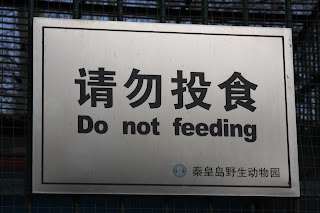As I've mentioned multiple times, one of the joys of teaching English in China is the continual exposure to Chinglish. I don't think it matters how long I've lived here--hearing Chinglish never fails to make me laugh. Through all the lessons and and classes I've taught in China, I've had the pleasure of accumulating loads of good Chinglish moments and it is my great pleasure to again share with you some of my new favorites, just from the last semester or two.
Last week in class we were talking about the future and what changes might come in the next several decades. I asked my students to make a list of some inventions they predicted would exist in the year 2040. What followed was a goldmine of Chinglish. Apart from some pretty unique and interesting ideas, the lists contained all the standard things you'd expect: time machines, interstellar travel and, naturally, reusable toilet paper. Here were my favorites, completely unaltered:
-move house
-change color clothes
-needn't gasoline car
-multi-function house
-touch the stars
-solar clothes
-the people can fly in sky with some machine (no, it's not a plane--I asked)
-the battery can use forever
-the paper can wash your hair without water
-invite a bike that can ride in the sky and in the sea
-invite a cloth that swear it can make people in the winter more warm. and in the
summer more cool.
-the weather control construments
-intelligent robot
-regret medicine (this was popular--at least three other students put this exact item.
Apparently, it's medicine that can make you forget all your regrets in life)
-permanent power engine
-water instead of oil started the car
-time machine: an age can move through
-shine wall
-indifferent water
-the car can fly and the traffic is not crowd
-the world peace
-a pair of glass that we can see future when we put on it
-a cap can get a haircut when your hair need cut
-a pot can make food automatic when you want to eat
-a bag a flour you can't use up forever
-memory bread
-the shoes that have new function
-a gloves that have lot of power
-a T-shirt color can control. by people.
-a ring that have room in it's bosom
-from gravity shoes
-people will live in the outside of space
-fly hot
-hide clothes (I think they meant invisibility clothes)
-a pair of glasses can therapy myopia
Now, there was one student who had such an amazing way with her English words that I wanted to specifically tell you about her list. The following give a great insight into Chinese-to-English translation and are a good example of how the Chinese language goes about describing certain nouns or ideas. I've taken the liberty of "translating" this student's English for you:
-the repeated use of toilet paper = reusable toilet paper
-cut all kinds of hair of the robot = robot barber
-through the ancient and modern future machine = time machine
-put on let people become thin clothes = figure-slimming clothes
You can't make this up.
The beauty of knowing English natively and having a significant knowledge of the Chinese language (both from study and daily interaction) is that I can actually learn a lot about Chinese and English from Chinglish. Many low-level students will write what is essentially a Chinese-style sentence, in English. That is, they'll basically construct a sentence using Chinese grammar and word order and then write the English words instead of the Chinese. I've actually learned a lot about Chinese language from this method, especially about grammar. I've also come to appreciate just how crazy and difficult English can be and I've developed a better understanding of why students make the common mistakes they do. At this point, when i hear or see Chinglish I can usually pinpoint the exact reason why the Chinese-to-English translation created that particular mistake. Pretty interesting...
Another activity I played in a different class is called the alibi game. In this game, I tell students about a "crime" that occurred the night before and that they are all suspects. With a partner, they must create an alibi to prove their innocence while the other students will interrogate them about their alibi. Here are the favorite alibis:
I was practice the kung fu last night.
I meet my best friend and we were went shopping in French last night.
We were died for a while, and we didn't know what happened, and didn't know who saved us today.
We were watch concert lived in Korea. And we backed this morning.
We were staying with aliens on outspace, we didn't on earth.
Jack Chan teached me Chinese Kung Fu.
Last night I joined in Zhang Jie and Xie Ha's weeding ceremony.
That time we were play the badminton.
We were playing the card last night, so we can't the suspect.
And then there's the ol' "ask the teacher anything" Q&A that always yields some great Chinglish. Some favorites from this term:
-Why you foot is so big?
-Why your face so little?
-Why do you want to China?
-Can you speak Chinese? If you can, I think we will have a convenient talk.
-I want you can help me to improve my speaking English
-Can you speak something interest things in China?
-What's experience to make you feel relax in China?
-Are you get married with somebody?
-How old are your?
-What do you like China or dislike China
-Where are you come from?
-How long are you stay in China?
-Would like to drink milk?
-Do you like fishing, sleeping, and shopping?
-How about China in your mind?
-How long with you in China?
-Where are you come to?
-I want to you speak Chinese.
-Where are you?
-Could you make a self-introduce?
-I want to see you handsome!
-What's your favourate?
-What are you tellphone?
-What about you think us?
-Do you have the wife?
In one class, I was teaching idioms. We played a game where I had written a list of the endings of many common English idioms on the board. Then, I would write the beginning of one particular idiom and the students would have to guess the correct ending from the list. One idiom, "couch potato," lent itself to some funny madlib-esque non-sequiturs. When I wrote "couch" on the board, some students came up with some real gems regarding the proper match. The funniest part about it is that while the following are hilarious to me, my students (understandably) didn't understand what was so darn funny. Unfortunately, I think my knee-jerk reaction to bust out laughing may have been interpreted as mockery by a few. But what can I do? It was just hilarious to hear what endings my students thought would fit with the beginning "couch." My favorites:
couch...in the pants (from "ants in the pants")
couch...gets the worm (from "the early bird gets the worm")
couch...gathers no moss (from "a rolling stone gathers no moss")
Awesome. Or maybe you had to be there.
And finally, I want to share a few things with you about the Chinese language that I absolutely love. First, I've discovered some wonderful Chinese idioms that I wanted to share. Being a person who loves the random and absurd humor of non-sequiturs, I thoroughly love the completely random nature of many Chinese idioms when translated into English. You'll see what I mean.
There are many four-character Chinese idioms, most of which are associated with some traditional story or myth that explains the meaning of the idiom. This is important since the four characters are associated with the story but by themselves usually give little or now clue as to the meaning of the idiom . Without an understanding of the story, I (as an outsider of Chinese culture) amcompletely at a loss--translating the four characters word-for-word into English only provides a random mess of words. Now, my favorite Chinese idioms (so far):
马马虎虎 (ma ma hu hu) = horse horse tiger tiger
meaning: something that is so-so, mediocre
鸡飞狗跳 (ji fei gou tiao) = chicken fly dog jump
meaning: as a last resort, one may resort to crazy/desperate actions
车水马龙 (che shui ma long) = car water horse dragon
meaning: a bustling, lively street scene
鸡飞蛋打 (ji fei dan da) = chicken fly egg hit
meaning: to try to salvage something that is beyond saving
掩耳盗铃 (yan er dao ling) = cover ear steal ring
meaning: when trying to deceive others, one only deceives himself
人山人海 (ren shan ren hai) = people mountain people sea
meaning: people are everywhere
好啊好学天天向上 (hao hao xue xi tian tian xiang shang) = good good study day day up
meaning: daily study will bring daily progress
Lastly, I'd like to share with you some of my favorite Chinese words. A unique feature of the Chinese language that lends itself to some great literal translations lies in the nature of how the language is set up: each character represents a one-syllable sound, and each character/syllable generally will have a unique meaning. For simple words, one character/syllable is enough. For example: 猫 (mao) = cat, 盘 (pan) = plate, and 书 (shu) = book. For more complex words, two characters will be combined, even more complex words would use three characters....you get the idea.
So the fun comes with translating literally the more complex words. What follows is a brief list of some of my favorite Chinese words when translated literally:
火车 (huo che) = fire car = train
飞盘 (fei pan) = fly plate = frisbee
飞机 (fei ji) = fly machine = plane
电话 (dian hua) = electric talk = telephone
电脑 (dian nao) = electric brain = computer
手机 (shou ji) = hand machine = cellphone
火鸡 (huo ji) = fire chicken = turkey
Hilarious.
Of course, when the Chinese say "火车" they aren't thinking "fire car"--they're thinking "train" and it's the same for all these words. But that doesn't change that fact the the Chinese word for turkey literally translates as "fire chicken." How could you not be amused?






































